Division
FOOD PRODUCT QUALITY EVALUATION DIVISION
 FOOD PRODUCT QUALITY EVALUATION DIVISION (FPQE)
FOOD PRODUCT QUALITY EVALUATION DIVISION (FPQE)
Food Quality is the measure of the desirability of any food product and is one of the factors that influences consumer preference and acceptability of a food product. Reasons for testing product quality include: to determine the effects of variations in processing on quality, to know the consumers’ preference, to detect the presence of off quality/ deterioration in food product quality and for the purpose of research and development in the development of new food products.
The Food Product Quality Evaluation Division in FIIRO houses into three major Sections: Sensory Evaluation section, The Animal House and Food shelf life studies section.
SENSORY EVALUATION SECTION
Sensory evaluation:
Humans have five senses: taste, smell, touch, sight and sound. All these are important when eating and if anyone is missing the acceptability of the food product is not complete. Sensory evaluation is a science that involves the use of one or more tests to assess the different qualities of food.
Sensory evaluation is used to improve the sensory qualities of a food product to ensure inter-batch consistency. It is conducted to understand the sensory characteristics of the product and how they influence the consumers’ preference. It enables one to understand how products perform against competitors’ products in relation to consumers’ perceptions and sensory characteristics. It is also conducted to determine whether or not consumers can detect differences between products or changes in the product due to recipe modification. . The different types of sensory evaluations tests includes
Difference tests
Rating tests
Sensitivity tests
Descriptive tests
Affective tests
The sensory evaluation section is actively involved in all the stages of R & D operations for food product development and processing in the Institute.
The section undertakes sensory evaluation for projects students from tertiary institutions as well as for private and corporate food processors. The section also ensures screening, training and retraining of sensory panelists.
The features of the sensory evaluation section include: sophisticated sensory booths housed in a sensory evaluation laboratory that conform to international standards (separate air conditioning maintained at (23±2OC) and relative humidity of (40±5%),
A preparation and serving area, Glass wares and containers for sensory evaluation of a wide variety of food products, Statistical evaluation of sensory data and special soft wares for analysis of data generated.
Some of the recent sensory evaluations conducted include:
- Sensory evaluation of Bread cake
- Sensory evaluation of Biscuits
- Sensory evaluation of 72-hr fermented African Yam Beans (From Biotechnology Department)
- Sensory evaluation of Ogi( pap) with Sprinkles
- Sensory evaluation of Smoked Fish – contract product analysis
- Sensory evaluation of NUNU Drink – contract product analysis
- Sensory evaluation of Biscuits
- Sensory evaluation of Bread cake
- Sensory evaluation of Bread – contract product analysis
- Shelf life studies of High Nutrients Density Biscuits for School feeding (six months storage studies)
- Sensory evaluation of FIIRO Developed Sports drinks from indigenous fruits
- Consumer Acceptability studies of High Nutrients Density Biscuits for School feeding in Schools around Lagos.
- Sensory evaluation of Rice Crisps
- Sensory evaluation of Bean flour chips.
- Sensory evaluations of Food R&D Products during shelf life studies.
ANIMAL SECTION (ANIMAL RESEARCH LABORATORY)
The animal section is saddled with day-to-day aspect of animal experiment which involves the designing, monitoring, execution and evaluation of all animal research in the entirety of Food Technology Department is domiciled and executed in the animal section of the Division. The Animal section gives life and applied meaning to most of the researches carried out in the Department with added beauty.
In the Animal house laboratory, we conduct efficacy studies, toxicological studies (gastro-intestinal, skin, eye), analytical studies, carcinogenic and genetic studies, fundamental biological research studies, physiological and pharmacological studies, biomedical and cosmetic tests research studies and other specialized contractual studies.
In the FQE Animal Section, we also conduct contract research, whereby other Institutions and Organizations can come in to key into our state of the art Animal House to carry out their researches and make use of the available facilities and cages for digestibility trials. Where animals are used in research processes, they are used as part of a range of scientific process techniques which might include human trials, computer modelling, and cell culture among others. Animals are only used for parts of research where no other technique can deliver the answer and in FIIRO, we make use of expertise of our Scientists in this field of study to add value to human life and well-being. Major breakthroughs in science had been through serious compelling efforts in the use of animals and animal researches give better credence and add to the veracity of the results of most researches.
In the Federal Institute of Research, Oshodi (FIIRO), the Animal Section had just concluded research into two major on-going researches, namely: the Fish Meal Analogue research and Ready to Use Therapeutic Food(RUTF) for the Severe Acutrely Malnourished (SAM) children.
SHELF LIFE STUDIES SECTION
Shelf life studies is an integral part of product development and it’s used to determine the influence of different storage conditions and packaging materials as well as length of storage on the nutrient quality, organoleptic and structural properties of food. It is also used to evaluate the impact of storage on the integrity of the food product.
This section works alongside the sensory evaluation section. A lot of biochemical analyses, physicochemical, microbiological and chemical analyses are also conducted. The influence of various storage conditions ranging from ambient storage to refrigerated and frozen storage as well as extreme storage conditions are evaluated with periodic sensory analysis. Accelerated storage studies are also often conducted on food products. The period of study for most food products range from 3months to 12 months. Some may even extend to 2years.
In general the Product Quality Evaluation division is equipped with Research scientists with different areas of specializations. These include Food technologists, Biochemists, Agric. Scientists, Physiologists as well as technologists all working in synergy to ensure adequate and effective Food quality evaluations. We also offer advices to researchers on experimental designs at the inception of Food product R & D projects.
Contact the Division
Oluwatoyin Victoria Oke, MSc (Food Technology)
Chief Research Officer and Head, Product Quality Evaluation Division
Food Technology Department
Federal Institute of Industrial Research Oshodi,
Lagos, Nigeria.
Tel: 2348033523780
Email: This email address is being protected from spambots. You need JavaScript enabled to view it., This email address is being protected from spambots. You need JavaScript enabled to view it.
PULP & PAPER TECHNOLOGY DIVISION
 The Division is one of the divisions in Chemical, Fibre and Environmental Technology department of the Institute.It is one of the foremost research laboratories of the Institute from its inception in 1956. The division has good researchers with sound background knowledge in various disciplines ranging from Botanist, Processing/Chemical engineer, Wood scientist, Industrial and Analytical chemist, Environmentalist. Among its various functions are; screening of local wood and non-wood plants for suitable; sources for long fibre pulps; development of process technology and mechanism for pulping of various plant materials; production and characterization of paper samples and packaging materials from various pulps and industrial training programmes to college and university students.
The Division is one of the divisions in Chemical, Fibre and Environmental Technology department of the Institute.It is one of the foremost research laboratories of the Institute from its inception in 1956. The division has good researchers with sound background knowledge in various disciplines ranging from Botanist, Processing/Chemical engineer, Wood scientist, Industrial and Analytical chemist, Environmentalist. Among its various functions are; screening of local wood and non-wood plants for suitable; sources for long fibre pulps; development of process technology and mechanism for pulping of various plant materials; production and characterization of paper samples and packaging materials from various pulps and industrial training programmes to college and university students.Vision of the Division
To be a world-class laboratory research centre for pulp and paper technology
Mission of the Division
Our mission is to proffer solution to challenges facing paper mills due to high cost of importing long fibre pulps.
This will be achieved by;
Continuously carrying out consistent screening of local wood and non-wood plants for long fibre pulps; Studying the process technology, mechanism and various pulping methods for these woods and non-wood materials.
Current Research Projects
1. Production of pulp and paper from agro-wastes and certain annual grass plants using secondary fibre formulation.
2. Biochemical pulping of agro-wastes materials
ACHIEVEMENTS;
1. Sourcing of long and medium length fibre pulps from locally available woods and non-wood materials. Amongst the woods and non-woods investigated include; Gmelina arborea, Bambusa strictus, Terminalia ivorensis, Cedrela odorato, Musanga cecropiodes, Oxystigma manni, Dendrocalamus arundinacia, Rhizophora racemosa, Ceiba pentandra, Adansonia digitata, Bombax buonopozense, Sterculia setigra, Polyata longifolia, Kenaf(Hibiscus cannabinus), Cocchorus olitorius, Empty palm fruit bunch, just to mention a few.
2. Utilization of wood wastes for production of various boards and other industrial applications.
3. Use of water Hyacinth(Echhornia crassipes) for pulp, paper and board productions.
Among its various functions are;
1. Screening of local wood and non-wood plants for suitable sources for long fibre pulps.
2. Development of process technology and mechanism for pulping of various plant materials.
3. Production and characterization of paper samples and packaging materials from various pulps.
4. Industrial training programmes to college and university students.
Contact the Division
Dr. F.A.T Owolabi (FIOR)
Deputy Director (Pulp & Paper Technology Division)
PhD (Bioresources Pulp & Paper)
MSc. (Organic Reaction Synthesis)
BSc. (Chemistry)
E-mail: taiwo.owolabiThis email address is being protected from spambots. You need JavaScript enabled to view it.; fathok2375This email address is being protected from spambots. You need JavaScript enabled to view it.om; fathok2375This email address is being protected from spambots. You need JavaScript enabled to view it.om;
Phone: +2349078445517
BAKING AND MILLING DIVISION
 The Division was established to conduct research and development into food and agro- allied
The Division was established to conduct research and development into food and agro- allied
processing technologies in:
1. Composite bread and Flour baked confectionery making.
2. Milling specifications of locally available grains (corn, sorghum, millet e.tc), tubers (yam, sweet and Irish potato) and other agricultural produce such as plantain, banana.
3. Rheological evaluation of composite flours for use in baking and related applications.
4. Utilization of local flours from indigenous food crops for product development to promote value addition.
5. Technology Transfer through training programs and workshops for investors and Small and medium scale entrepreneurs.
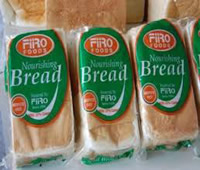
Programs of the Division:a· Bread production program.
b. Flour and Meal Production Program
Vision of the Division
To be a center of excellence in baking and milling technology using indigenous raw materials
Current projects in the Division:
i. Development and production of low fat and low sugar bread for better nutrition and health management.
ii. Utilization of plantain and banana flour in baking and flour confectionery production.
iii. Incorporation of Orange Fleshed Sweet Potato in bread, for economic and nutritional benefits.
iv. Development and Production of Multigrain bread from Indigenous sources, to serve as a nutritious and healthy alternative to white bread.
v. Upgrading the indigenous technology for the production of a local cowpea snack, highly relished and popularly consumed in SW Nigeria, for improved availability, acceptability and stability.
Unique products from the Division
a. Composite flour bread and other flour based confectionery products
b. Instant pounded yam flour
c. Beans Flour, Plantain Flour and Enriched Yam Flour
Developed technologies
1. Established processing technologies for composite flour bread and other Flour Based confectionery products.
2. Commercial utilization of soybeans for baking applications.
3. Established processing technology for instant pounded yam flour production.
4. Established processing technology for the production of Ripo meal (a pounded yam flour substitute)
5. Established processing technology for Beans flour production.
6. Formulation and Development of a Ready-to-Eat Nutritious cereal based meal (Nourish) that can serve as food aid for hunger and emergencies.
Contact the Division
Dr. A.A. Osibanjo
Deputy Director (Baking & Milling Division)
PhD Food Processing & Storage Technology
Master of Science in Food Technology
Bachelor of Science in Human Nutrition
E-mail :This email address is being protected from spambots. You need JavaScript enabled to view it.; This email address is being protected from spambots. You need JavaScript enabled to view it.
Phone No:+2348023416054
POLYMER & TEXTILES DIVISION

Vision of the Division
To be the foremost centre for research and development in the area of polymer and textiles
Mission of the Division
To conduct market driven research towards developing technologies relevant to micro, small and medium scale enterprises involved in the area of polymer and textiles.
On-going Research Projects
1· Production of non-metallic vehicle car parts from Kenaf composites
2· Production of glycerol from biodiesel of waste cooking oil
3· Production and application of mechanical penetration enhancers (MPEs) from bio-degradable polymers
Developed Technologies
1· Polymer composite production
2· Polymer processing
3· Fiber extraction
4· Fiber spinning and weaving
5· Polymer and fiber testing
6· Tie and dye processes
7. Adhesives from cow bones
8. Adhesives from cassava starch
9. Cassava starch for pulp, paper & textiles
10. Agro-sacks production from kenaf, banana & plantain fibre
Contact the Division
Dr. Francis Ezebor
Deputy Director (Polymer & Textiles Division)
PhD (Chemistry); MSc (Industrial Chemistry); BSc (Biochemistry)
Professional Bodies:-
1. Institute of Chartered Chemistry of Nigeria (ICCON)
2. Chemical Society of Nigeria (CSN)
3. Institute of Packaging Nigeria
Email: francis.ezeborThis email address is being protected from spambots. You need JavaScript enabled to view it.; efezrfrancisThis email address is being protected from spambots. You need JavaScript enabled to view it.
Phone number: +234-9021754041; +2348067481256
NUTRITION AND TOXICOLOGY DIVISION

Nutrition and Toxicology division is one of the major divisions of the Department of Food technology with particular mandate on promoting, production and consumption of nutritious and safe processed foods for different age groups as well identifying and bridging nutritional gaps for different health related challenges using indigenous carefully selected crops.
The division also conducts nutritional evaluation, sensory evaluation, and toxicological studies on established products as critical requirement for food product development prior to consumer acceptability studies. In addition to this, the division also carry out research on dietary planning and management.
Vision of the Division
To be an international center of excellence in Nutrition, Nutraceutical and Functional food technology.
CURRENT RESEARCH PROJECTS IN THE DIVISION
1· Research and development on nutraceutical and functional food products for prevention and management of various diet related and chronic disease conditions.
2· Development and formulations of food for people with special nutritional needs (HIV/AIDS and diabetic patients, people suffering from acute malnutrition, weaning children)
3. Research into food fortification and enrichment.
Research activities and consultancy
- a. Nutraceutical and functional foods
Assessment of the beneficial health effect of Nigeria medicinal plants and crops, designed for human diet/consumption, on pathological animal models (cardio-vascular diseases, inflammatory diseases, obesity, diabetics and gut health)
- b. Food toxicology
Assessment/evaluation of the safety of food products using in vitro and in vivo studies and development of tools for reducing the toxicity of toxic substances in foods, enhancing techniques for preservation and reduction of contamination in foods to improve food nutritional safety.
- c. Sensory evaluation and quality control/assurance of different food products developed in the department
COMPLETED PROJECTS
1. Production and evaluation of high protein instant and semi instant weaning foods from blends of indigenous cereals and legumes (millet, maize, rice, cassava, soybean, sesame and Bambara groundnut
2. Utilization of soybean in snacks and confectioneries production
3. Dehydrated mushroom and its utilization in food formulation.
4. Utilization of tiger nut and soybean in the production of milk, beverage drinks, yoghurt, ice cream and mayonnaise.
5. Production and evaluation of novel extruded snacks from blends of indigenous crops
6. Production and fortification of garri with protein and micronutrient from plant and animal sources.
7. Preparation and packaging of Nigerian traditional dishes
8. Utilization of indigenous fish species in development of food products
9. Production of micronutrient sprinkles for food fortification.
10. Effect of processing on the nutritional, functional and sensory properties of bambara groundnut and cowpea and their utilization in biscuit and fermented gritty cassava meal (garri) fortification.
CURRENT PROJECTS IN THE DIVISION
i. Production and evaluation of micronutrient sprinkle from indigenous crops
ii. Investigation of the anti-diabetic properties of FIIRO produced hypoglycemic drink in rats
iii. Development of antilipemic/hypolipidemic snacks from selected fruits for the management of obesity.
iv. Glycemic indices of commonly consumed foods in Nigeria.
Contact the Division
Mordi, James Iwebuno
Deputy Director
E-mail : mordi.jamesThis email address is being protected from spambots. You need JavaScript enabled to view it.; mordij2000@gmail.com
Phone No:- +2347016969551; +2347030099526
PACKAGING TECHNOLOGY DIVISION

The Division was established to provide solutions to packaging problems of FIIRO and the nation at large it is domiciled in the Chemical, Fibre and Environmental Technology department of the institute.
Among its various functions are:
1. Development of high quality packaging materials that meet global safety standards and affordable to SMEs.
2. To provide consultancy services to entrepreneurs and corporate bodies on packaging issues.
3. To provide packaging education through the organization of seminars, conferences and
workshops for entrepreneurs, corporate bodies and the public.
Vision of the Division
To be the centre of excellence in packaging for industrial growth and sustainability
Mission of the Division
To carry out consistent packaging research and development activities to drive industrial packaging innovations for the industrialization of the nation
Developed Technologies In Packaging:
1. Packaging materials (transparent films) for snacks, biscuits, confectionaries and cereal
Products
2. Packaging materials for bath-bar and black soaps
Current Research Projects
1. Design and development of packaging materials (modified atmosphere packaging) for snacks and low shelf life food products -peanut, plantain chips, etc
2. Design and development of suitable packaging materials (flexible packaging) for pasty food products (Tomato, Pepper and Onion)
3. Design and development of suitable packaging materials for food products in powdery food products.
4. Design and development of packaging materials for fresh fruits and vegetables from natural sources.
Contact the Division:
Dr. Hassan Muili Tunde
Head (Packaging Technology Division)
Ph.D. (Environmental & Climate Change)
MSc (Environmental Management & Protection)
BSc (Environmental Management & Toxicology)
Professional Bodies
1. World Packaging Organization
2. Institute of Environmental Science
3. National Institute of Metiology
E.mail: tunde.hassanThis email address is being protected from spambots. You need JavaScript enabled to view it., tundehassan78This email address is being protected from spambots. You need JavaScript enabled to view it.
Phone No: +2348025861139, +2348162328967
PRODUCT DEVELOPMENT DIVISION
 Vision
Vision
To be the core of food-based research and development for sustainability of the economy.
Mission
To develop value-added products from indigenous raw materials for food security, industrialization and socio-economic development of Nigeria.
Activities of the Division
This division is dedicated to the processing and utilization of indigenous raw materials such as cereals and legume, fruits and vegetables, meat and fleshy foods, roots and tubers for the development of both intermediate and finished products for the growing population. The division establishes suitable process technologies through research and development by upgrading existing traditional technologies for each crop and product of target.
The strategic objective of the division is to conduct basic and applied research using a focused multi-disciplinary approach in developing consumable products on laboratory scale levels. The division also generates adequate processing data for semi-pilot and pilot scale-up of research innovations made at the laboratories scale. Established guidelines by regulatory bodies and Quality Standards required for food safety and quality management are strictly adhered to during product development. These include; HACCP, SOP, GMP, Food code(s), etc.
The division has a major mandate to process and preserve indigenous raw materials thus reducing post-harvest losses and ensuring food security. The division has worked extensively on different fruits such as orange, mango, pineapple, watermelon, dates and vegetables such as okra, cassava leaves, carrot, garden egg, tomato. Also, on various roots and tubers such as cassava, yam, sweet potato, potato Irish, cocoyam, ginger, plantain; and cereals and legumes such as maize, sorghum, acha, millet, bambara nut, groundnut, soybean, rice, etc for the development of various shelf stable products. Additionally, fleshy foods such as fish, meat and dairy products are processed for human and animal consumption. Developed technologies in Food Product Development Division are thus available for adoption by small, medium and large scale entrepreneurs.
The division regularly trains undergraduates from tertiary institutions under the Student-Industrial Work Experience Scheme (SIWES) on food research technologies.
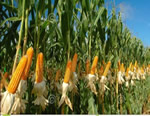 Developed Technologies in FIIRO Resident in PD Division:
Developed Technologies in FIIRO Resident in PD Division: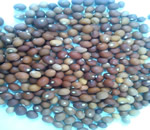
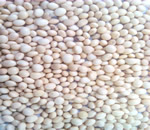
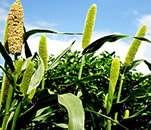
1. Soy-Ogi; Infant and Adult formulations.
2. Production of Sorghum malt.
3. Groundnut processing into snacks.
4. Production of maize flour and maize grits.
5. Production of Instant and semi instant soy enriched breakfast cereals.
6. Composite flour for snacks and confectionaries.
7. High nutrient density biscuits for school aged children.
8. Bambara groundnut flour for steamed paste and deep fried cake.
9. Bambara groundnut flour pre-mix for cookies production.
10. Coconut-based pre-mix flour for cookies production.
11. Production of high fibre meals from selected blends of cereals and legumes for the elderly.
12. Production of Instant pounded yam flour.
13. Production of Tapioca.
14. Production of soy-enriched yam flour (Elubo).
15. Production of dried cassava chips.
16. Production of Cassava-based Macaroni Noodles.
17. Production of Cocoyam thickeners for soup
18. Production Cocoyam chips and flour
19. Production of Garri from dry cassava chips.
20· Production of dehydrated fruits from pineapple, pawpaw, banana, mango, tomatoes, peppers (chili, pimento, bell and green pepper).
21. Production of dehydrated vegetables from green leafy vegetables (fluted pumpkin leaves, amaranthus, bitter leaves), okra, green peas, carrots, stringed beans etc.
22. Production of Spices and herbs (ground spices hot pepper and ginger, turmeric, garlic)
23. Production of Fruit Powder products - the use of powder-seasoning or drink from banana, plantain, mango, Roselle (zobo) tea infusions,
24. Production of Fruit juice mixes and fruit drinks from pineapples, mango, oranges, pawpaw, banana, cashew, watermelon.
25. Production of Fruit purees, Nectars, Fruit cordials
26. Production of jams and jelly- substance of gelling power
27. Production of High fiber drinks from indigenous selected fruits for the elderly
28. Production of Hypoglycemic drink from selected blends of indigenous fruits for the diabetic.
29. Production of animal feed for growing Grasscutter (Thryonomys Swinderianus) using indigenous crops.
30. Production of high quality packaged snail feed for growing snail (Achatina achatina) using indigenous crops
Contact the Division
Dr O.O. Oladunmoye
B.Sc, M.Sc, Ph.D Food Science & Technology
MNIFST, MNSN
Deputy Director (Product Development Division)
Federal Institute of Industrial Research Oshodi (FIIRO),
Lagos, Nigeria, West Africa.
+234802-354-0666; This email address is being protected from spambots. You need JavaScript enabled to view it.; and
This email address is being protected from spambots. You need JavaScript enabled to view it.
This email address is being protected from spambots. You need JavaScript enabled to view it.
ENVIRONMENTAL TECHNOLOGY DIVISION

The Environmental Technology Division of FIIRO started more than two decades ago. The division was set up to carry out Research & Development on waste management and its sustainability. Thus assisting industries in environmental remediation and ensuring a clean environment. The division is made up of Chemists, Microbiologists and Environmental scientists. It has facilities for environmental analyses; it has been involved in R & D activities into the treatment of waste effluents from various industries using biological and chemical methods and the design of pollution abatement devices so as to ameliorate the environmental pollution in the country. It is currently involved in the conversion of solid wastes mainly agricultural wastes to value added products.
Vision of the Division:
To be a reference point in the development of environmentally friendly R & D technologies for all industrial operations in Nigeria
Mission of the Division:
To conduct research and development activities in environmental pollution, industrial wastes management and development of industrial pollution abatement/containment devices for a cleaner environment.
Mandate:
1. Development of effluent treatment technologies using local raw materials.
2. To promote cleaner production by reducing wastes in the environment through the process of recovering, recycling for re-useable purposes.
3. To provide consultancy services to industries, Federal and State agencies and International organizations.
4. To promote mass education and advocacy on national and global environmental issues
Current Research Projects:
· Conversion of solid waste to domestic and industrial fire-logs
· Bio-conversion of organic solid waste to organic fertilizer
· Production of lactic acid, citric acid and ethanol from agricultural wastes
· Production of oxalic acid from agricultural wastes
· Production of dense and hollow blocks from agricultural wastes
Developed technologies
1· Chemical & biological treatment of industrial wastewaters and liquid effluents from industries
2· Design & fabrication of universal pollution abatement device and industrial liquid effluents
3· Production of modified clay as adsorbent for treatment of wastewater
4· Recovery of pure slaked lime from automobile welders’ carbide sludge
5. Extraction, characterization and utilization of cashew nutshell liquid from cashew nut shell
6. Production of sodium silicate from rice husk.
Contact the Division
Dr. Jane Adamma Chukwudebelu
Deputy Director (Environmental Technology Division)
PhD (Environmental Management & Control);
MSc (Environmental Management);
MSc (Industrial & Labour Relations);
BSc (Biochemistry)
Professional Bodies:-
1. Nigerian Environmental Society
2. Citizen Science Zurich
3. African Roundtable on Sustainable Consumption & Production
4. Institute of Chartered Chemist of Nigeria (ICCON)
5. National Adaptation Forum USA
6. Occupational Safety & Health UK (Fellow)
7. United Nations World Data Forum
8. Nigeria Institute of Food Science & Technology
9. Chemical Society of Nigeria
10. Association of Industrial Microbiology of Nigeria
Phone No: +234 8023004406; +234 8112104671
E-mail: This email address is being protected from spambots. You need JavaScript enabled to view it., adabebeluThis email address is being protected from spambots. You need JavaScript enabled to view it.
Page 3 of 4
